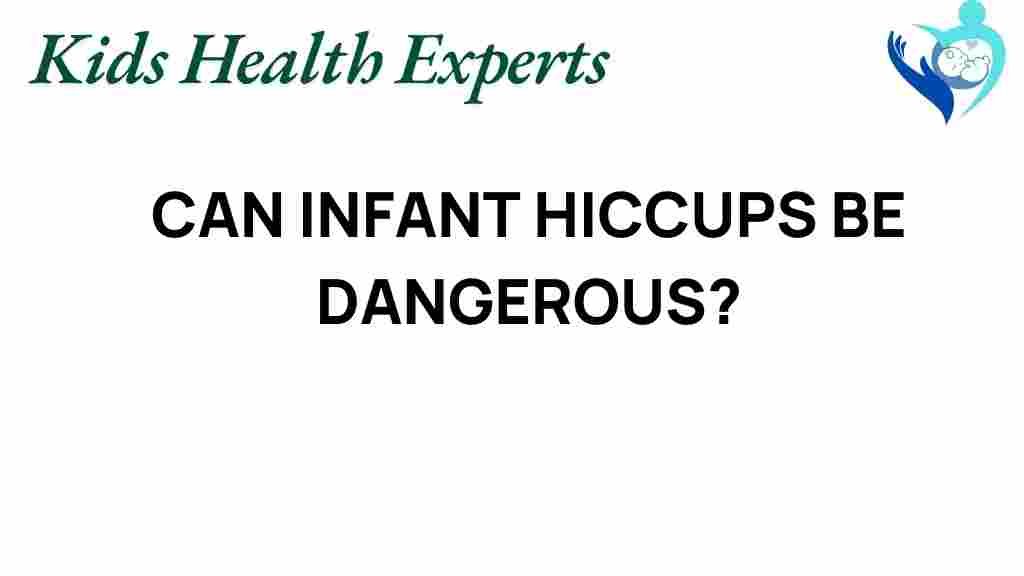Are Infant Hiccups a Cause for Concern?
As a new parent, you may find yourself worrying about every little sound your baby makes. One common occurrence that can leave parents puzzled is infant hiccups. Many parents wonder, “Are infant hiccups a cause for concern?” This article will unravel the myths surrounding infant hiccups, provide insights into baby wellness, and offer parenting tips to help you navigate this common phenomenon. We’ll also touch on health concerns and pediatric advice to ensure your little one’s safety and well-being.
Understanding Infant Hiccups
Hiccups are involuntary contractions of the diaphragm muscle, which can happen to anyone, including infants. While they can be quite frequent in babies, it’s essential to understand that they are usually harmless. Here’s what you need to know about infant hiccups:
- Frequency: Hiccups are common in newborns and can happen several times a day.
- Duration: They typically last for a few minutes but can sometimes persist for longer periods.
- Causes: Infant hiccups can be triggered by various factors, including eating too quickly, swallowing air, or even sudden changes in temperature.
Common Myths About Infant Hiccups
There are several myths surrounding infant hiccups that can cause unnecessary worry among parents. Let’s debunk these common myths:
- Myth 1: Hiccups are a sign of an underlying health issue.
- Myth 2: Hiccups can harm the baby in any way.
- Myth 3: You should try to stop hiccups immediately.
- Myth 4: Hiccups are only caused by overfeeding.
Understanding these myths is crucial for reducing anxiety and promoting baby health. Remember, infant hiccups are a normal part of development.
Health Concerns Related to Infant Hiccups
While most infant hiccups are harmless, there are certain situations where they could indicate a health concern. Here are some signs to watch for:
- If hiccups persist for more than 48 hours.
- If your baby appears to be in distress or discomfort during hiccups.
- If hiccups occur frequently and disrupt feeding or sleeping.
In such cases, it’s essential to consult with your pediatrician for further evaluation. Keeping track of your baby’s hiccup patterns can be helpful when discussing concerns with your healthcare provider.
Parenting Tips for Managing Infant Hiccups
Here are some effective parenting tips to help manage and alleviate infant hiccups:
1. Feeding Techniques
How you feed your baby can influence the occurrence of hiccups. Consider the following:
- Slow Down: Ensure your baby is feeding slowly to reduce the amount of air swallowed.
- Burp Regularly: Burp your baby during and after feedings to release trapped air.
- Upright Position: Hold your baby in an upright position while feeding to minimize hiccups.
2. Keeping Calm
Stressful situations can contribute to hiccups. Aim for a calm feeding environment:
- Reduce distractions during feeding times.
- Use gentle movements and soothing voices to keep your baby relaxed.
3. Light Pressure
Applying gentle pressure to your baby’s tummy may help relieve hiccups:
- Lay your baby on their back and gently rub their belly.
- Hold your baby in a comforting position against your chest.
Step-by-Step Process to Alleviate Hiccups
If your baby experiences hiccups, follow this simple step-by-step process to help alleviate them:
- Pause Feeding: If your baby is feeding, pause for a moment.
- Burp Your Baby: Gently burp your baby to release any trapped air.
- Change Position: Try holding your baby in an upright position for a few minutes.
- Use Gentle Pressure: Apply light pressure to the tummy or rub in circular motions.
- Wait It Out: If hiccups persist, simply wait as they usually resolve on their own.
Each baby is different, so it may take some trial and error to find what works best for your little one.
Pediatric Advice on Infant Hiccups
When it comes to your baby’s health, pediatric advice is invaluable. Here are some key takeaways from pediatricians regarding infant hiccups:
- Normal Occurrence: Understand that hiccups are a typical part of infant development.
- Monitor Patterns: Keep a log of when hiccups occur and any accompanying symptoms.
- Consult When Needed: Don’t hesitate to consult your pediatrician if you have concerns.
For more information on infant care and health, you can refer to this resource.
Safety Considerations
While infant hiccups are generally not a cause for concern, keeping your baby’s safety in mind is crucial. Here are some safety considerations:
- Avoid using any home remedies that could pose a risk to your baby.
- Never shake or jostle your baby to stop hiccups.
- Always supervise your baby during feeding to prevent choking.
Ensuring your baby’s safety during these moments will help you feel more at ease as a parent.
Conclusion
In summary, infant hiccups are a common and usually harmless occurrence. Understanding the myths surrounding them can help alleviate parental anxiety about health concerns. By following the parenting tips and pediatric advice shared in this article, you can navigate hiccups with confidence and ease. Remember, if you ever feel concerned about your baby’s health, it’s always best to consult with a pediatrician for personalized advice.
For additional tips on baby wellness and care, check out Parenting.com for a wealth of resources.
This article is in the category Care and created by KidsHealthExperts Team

1 thought on “Are Infant Hiccups a Cause for Concern? Unraveling the Myths”